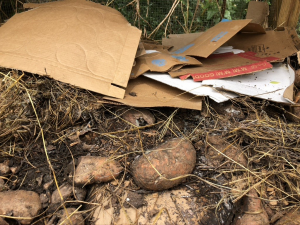Compost, Now!
By Davida Halev, Senior in Emory College, Sociology Major and Sustainability Minor
Georgia has a food problem and it’s not what you think it is. Despite one out of every seven Georgians being food insecure, over 800,000 tons of food waste ends up in Georgia landfills each year (Georgia Environmental Protection Division). In fact, food is the largest category of solid waste material filling landfills in Georgia. When food is thrown into the landfill, decomposing organic material emits methane, a powerful greenhouse gas that’s difficult to capture and even more potent than CO2. This, in turn, contributes to the warming of our planet rather than feeding families or refueling our soil. As Atlanta residents, this is especially important, as nearly half of the food waste filling Georgia landfills – 48% – comes from the metro-Atlanta area (Georgia Environmental Protection Division). We are part of the problem, and it is our duty to become part of the solution. There are two main areas that individuals should focus on in mitigating the impacts of household food waste: reducing excess consumption, and composting pre-consumer waste.
Much of the food wasted in households is due to poor planning, overbuying, and negligence. From purchase to plate to disposal, there are a variety of ways to reduce this impact. The best way to minimize your post-consumer food waste is to be intentional in purchasing and preparing your food. Reduce your excess consumption by buying only what you’ll eat, find ways to use up every ingredient in your fridge, and plan meals for grocery shopping. Meal prep was never as important as it is now: not only are you likely to eat healthier and save money, but you are preventing food from being thrown away. Websites like Save the Food offer resources to mitigate waste: inspiration for meals to cook, repurposing older or less delectable food parts, calculate exact amounts of ingredients, and free templates for shopping trips. A free meal prep planner can be found here.
Pre-consumer food waste, food untouched by cooking or consumption, are the food scraps we toss straight into bins that can be repurposed into regrowing our food through a process called composting. Composting is the natural decomposition of organic material. Picture a recycling center, but made out of bugs and organisms, and entirely natural. According to the EPA, food scraps and yard waste make up over 28% of household trash. Composting is an important part of closing the open loop of waste and forming a circular economy of food. Food can break down to create rich, nutrient filled soil, to grow other crops. It’s an important final step in diverting food waste from our landfills.
You can compost at home, which requires just three ingredients: “Greens”, which include your veggie and fruit scraps, coffee grounds, and egg shells; “Browns”, which include yard material such as dead leaves and twigs, and lastly, water. A step-by-step guide to composting at home, including what to use, can be found here. Backyard and community garden composting systems use only pre-consumer food waste. Those that may not have the facilities to start a home compost need not worry: save your kitchen and waste scraps in a sealed container. You can get your food waste picked up by an organization like CompostNow, or you can drop off your waste at a community garden compost. The Urban Food Forest at Browns Mill is one such center, with a community compost bin for members to bring in their scraps to be turned into nutrient-rich soil and goodness. The Wylde Center in Decatur also takes pre-consumer waste.
Nearly 40% of American food supply goes to waste every year. This is a massive and unjustifiable amount of wasted food that can be transformed into something usable. We must take it upon ourselves to take a little extra time and convenience from our routines to contribute in any meaningful way to minimize food waste. The gaping hole in our food system is something each of us must actively work to help close. Composting is a perfectly dirty way to start.
For more information on composting in Georgia, visit the FoodWell Alliance’s website at https://www.foodwellalliance.org/compost.

REFERENCES
“Composting and Mulching.” Environmental Protection Division, https://epd.georgia.gov/composting-and-mulching.
Composting in Georgia | Georgia Recycling Coalition. https://www.georgiarecycles.org/tools-resources/citizen-resource-guides/composting-in-georgia/.
“Food Matters Atlanta — AgLanta AgLanta – Urban Agriculture Atlanta.” AgLanta, https://www.aglanta.org/food-matters.
“Food Residuals Diversion.” Environmental Protection Division, https://epd.georgia.gov/food-residuals-diversion.
“Food Waste in America in 2020: Statistics & Facts | RTS.” Recycle Track Systems, https://www.rts.com/resources/guides/food-waste-america/.

